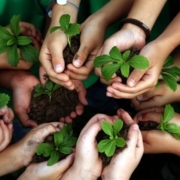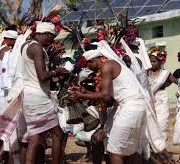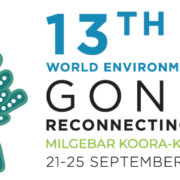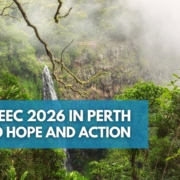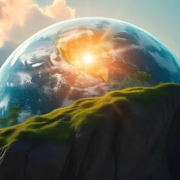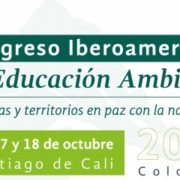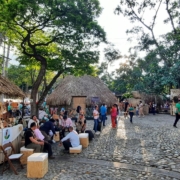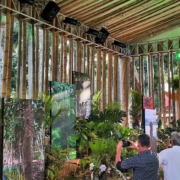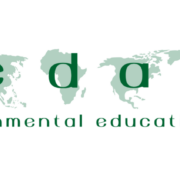On October 14th, 2024, the 8th World Environmental Education Day was celebrated. This date marks the anniversary of the 1977 UN Conference in Tbilisi, Georgia, where it was unanimously agreed that environmental education plays a vital role in safeguarding and enhancing the global environment. 47 years later, the World Environmental Education Congress (WEEC) remains dedicated to promoting environmental education as a key pathway toward building sustainable societies.
Since the establishment of World EE Day, WEEC has encouraged organizations worldwide to initiate activities and projects focused on environmental education throughout October. From festivals and conferences to workshops and academic research projects, we received numerous submissions through our online platform highlighting various World Environmental Education Day 2024 initiatives.
This final report highlights some outstanding and impactful projects from across the globe for this year’s World EE Day.
The project Food Waste Valorization for Nutritious Livestock Feeds Production aims to transform food waste into safe and nutritious feeds for livestock, promoting food security, sustainable livelihoods, job creation, and environmental conservation. In Uganda, where 16.4 million people face food insecurity, significant amounts of food waste are generated daily in urban areas, contributing to greenhouse gas emissions and pollution. Currently, food waste is fed directly to animals, posing health risks. This project uses insect-based farming to process food waste into high-protein feeds and bio-fertilizers. Black soldier fly larvae (BSFL) provide a nutritious alternative to costly traditional protein sources like fish and soybean meal, thus lowering livestock feed costs. By demonstrating technical and business models at Mukono Green Valley Innovation Hub, the project will empower youth to engage in insect farming, livestock management, and organic farming, ultimately fostering economic opportunities and improving food security.
The Digital Platform for Environmental Citizen Science is designed to empower individuals worldwide to actively contribute to environmental research and conservation. Through a user-friendly interface, participants can upload observations, measurements, and photos related to environmental factors like air quality, water pollution, biodiversity, and climate change. Guided projects within the platform support users in gathering targeted data to address urgent environmental challenges, while real-time data visualization through interactive maps and charts allows users to observe trends and patterns. Educational resources help participants deepen their understanding of environmental science and the value of citizen-driven research. By engaging people in meaningful data collection and analysis, the platform raises awareness, generates valuable data to complement scientific research, and empowers users to make a positive impact on their local environments. Partnerships with academic institutions, government agencies, and NGOs are envisioned to enhance project development, data analysis, and outreach, creating a collaborative network of environmental advocates.
ModelCOP is an innovative educational platform that immerses middle and high school students in global climate negotiations, helping them develop essential skills and values for environmental leadership. Through realistic simulations of international climate forums, students role-play as diplomats and climate experts, gaining insights into global climate challenges and collaborative solutions. The program combines online and in-person sessions for accessibility and engagement, targeting rapid growth across high-youth regions like the Middle East, Africa, Asia, and Latin America. With strategic partnerships, ModelCOP aims to reach over 5 million students in three years, creating a global network of educators, experts, and policymakers to support its mission.
The Bogotá Schools Environmental Summit is an initiative launched by students from Los Cerros Gymnasium to unite the educational community in addressing environmental challenges and promoting sustainability. The summit aims to educate and empower students to take action against climate change through conferences, project fairs, and workshops. The first edition in 2023 focused on establishing collaborative goals for environmental restoration, attracting over 60 participants from 15 institutions. The second edition in May 2024, held during an environmental crisis, engaged more than 120 students and teachers from 32 schools, featuring discussions on climate change challenges and showcasing student-led environmental initiatives. This summit not only inspires pride in students’ achievements but also fosters a collective commitment to combating climate change. By facilitating idea exchange and collaboration, the summit promotes continuous engagement in environmental projects and aims to establish a regional and global network for environmental education. Future editions will further enhance visibility for climate issues and strengthen partnerships with educational and environmental organizations.
Little Green Hero (LGH) is an innovative mobile and web application aimed at fostering environmental awareness among children aged toddlers to 8 years. Utilizing artificial intelligence, LGH creates an engaging and adaptive learning environment that introduces complex environmental issues in a way that is accessible and non-intimidating for young learners. The preliminary model has shown effectiveness in captivating children’s interest and promoting early environmental consciousness, highlighting AI’s potential to transform educational experiences in essential fields like environmental education.
Exploring the Oceans: Marine Education for Schoolchildren is an educational initiative aimed at enhancing students’ understanding of marine ecosystems through interactive workshops integrated into the school curriculum. The project involves three themed workshops tailored to each grade level, promoting hands-on learning through both outdoor activities and in-class practical sessions. The primary goal is to inspire curiosity about the oceans and foster environmental responsibility among students. Younger students will focus on basic marine life concepts, while middle and upper grades will delve into ecosystems, human impacts, and conservation strategies. Practical experiences include field trips to coastal areas, where students can observe marine ecosystems, engage in water testing, and participate in beach clean-ups. This program encourages active participation, enhancing knowledge retention and cultivating a conservation mindset. By connecting classroom learning with real-world experiences, “Exploring the Oceans” empowers students to become future stewards of the environment, deepening their appreciation for marine life and its challenges.
The Green Student Program is an initiative aimed at promoting environmental awareness and action among high school students. It empowers over 120 participants from 20 schools to become green changemakers by equipping them with the knowledge, skills, and resources necessary to tackle environmental issues in their communities. Through workshops and fellowships, the program emphasizes design-thinking strategies for developing solutions, career preparation for environmental pathways, and launching the first cohort of Green Student Fellows. Selected fellows will receive mentorship, sponsorship for a Climate Course, and support for their own student-led campaigns addressing local environmental challenges. The program also fosters ongoing opportunities through partnerships, bridging the gap between inspiration and actionable environmental education.
The Art of Climate Change Education project aims to enhance climate education for teachers in England and Kenya through the integration of art and artificial intelligence (AI). The initiative seeks to empower educators to become confident climate allies, capable of influencing their students and communities on climate action. Harwood Education, an English teacher training organisation, will lead the development of an AI-inspired visual art project and a Carbon Footprint Buster Challenge, providing educational materials to Kenyan schools in collaboration with People to People International, Kenya. Kenyan instructors will utilize the book Creating A Masterpiece: The Arts and Climate Change Conflict By Graydon to inspire students and raise awareness about climate change through artistic expression. Additionally, students will receive Life on Planet Earth: My Story, by artist Graydon, an activity book featuring art-based learning on ecology and climate change, which will be published and exhibited. The project promotes inclusivity by offering these resources in both English and Swahili, along with plans for translation into local languages, ensuring that climate education is accessible to all students and teachers involved.
The project initiated by ODDB NGO addressed the environmental challenge of plastic waste management, which poses serious issues like ocean pollution, blocked drainage systems causing flooding, the spread of diseases, respiratory problems from open burning of waste, and harm to wildlife. Recognizing the importance of educating young people, the initiative celebrated World Environmental Education Day 2024 by organizing an awareness session for students at the Public Primary School (EPP) of Tanto, followed by a cleanliness campaign in the surrounding area. The primary goal was to enhance environmental education in urban settings by informing students about the impacts of plastic waste and engaging them in cleanup efforts, successfully involving over 100 students in this important initiative.
Friendly SEED, the first Taiwanese social enterprise focused on environmental education (EE), was established in 2010 by a group of EE professionals dedicated to promoting sustainability. Through effective brand management and curriculum development, they have created systematic learning programs, initiated corporate ESG action plans with over 60 companies, and helped multiple nature education sites obtain certification as environmental education facilities. By fostering public-private partnerships with industry, government, and academia, Friendly SEED aims to drive positive impacts in environmental sustainability education. In celebration of World Environmental Education Day on October 14th, they organized various events, including corporate environmental action days, beach and mountain cleanups, training for environmental educators, hands-on career experiences for ecological workers like fishers, and DIY art-making activities using natural materials.
The 8th World Environmental Education Day saw significant participation, highlighting the community’s commitment to environmental education and sustainability. Additionally, many other projects were submitted, including “Chargé de sensibilisation sur la protection de l’environnement au sein de MKAAJI MPYA asbl”, a local association based in the province of South Kivu, Democratic Republic of the Congo; the “Red de Medio Ambiente” de la Universidad de La Habana; the “LACA” (Looking At Climate Action) project in Zambia; “Exploring the Oceans: Marine Education for Schoolchildren”, a project by the Vellmari Association and “Climate Fresk”, a French educational initiative designed to raise awareness about climate change through an interactive workshop.
These initiatives further demonstrate the collective effort to foster environmental awareness and action across various communities and educational settings.

